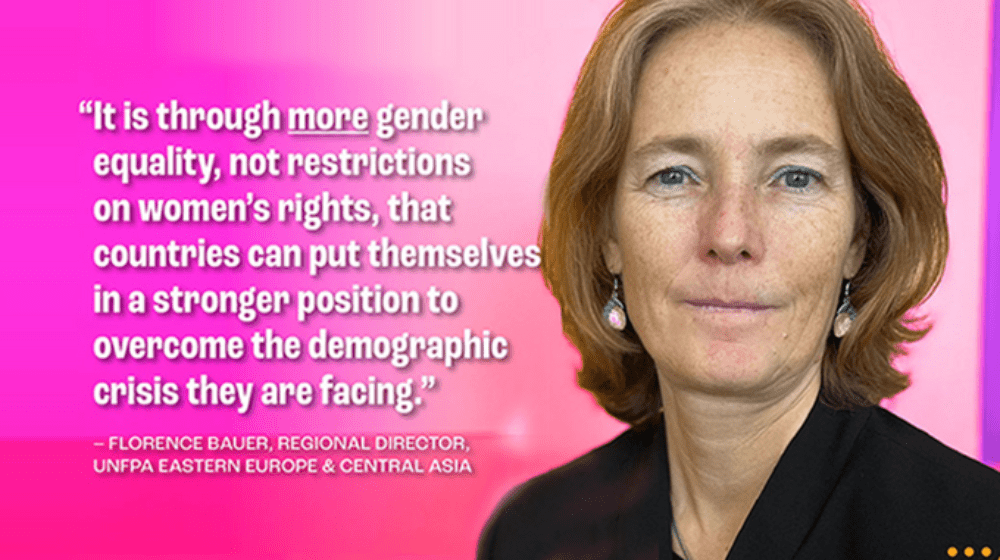If only women had more children, a widely held view goes, our demographic worries would fade away. Higher birth rates would stabilize population numbers, or even make them grow. Soon, the proportion of working-age people in employment would go up, easing concerns about how sustainable our social support and pension systems are. Eventually, increasing populations would drive economic growth and prosperity.
Sounds good? Perhaps. But there are two fundamental problems with this view.
First, it is very unlikely to happen. The reproductive choices people make are influenced by a complex mix of economic, social, and cultural factors, as well as personal preferences. Governments have tried to boost birth rates, mostly by providing financial incentives and greater family support. But so far, despite massive investments, no country in Europe has succeeded in bringing fertility rates to anywhere near the level required to halt, or even reverse, population decrease. (On a side note, even in the highly unlikely scenario that a country succeeds in significantly raising birth rates, this may, all things staying equal, just lead to more outmigration.)
Second, and perhaps more worryingly, attempts to get women to have more children can easily put at risk their reproductive rights – and even their equal status in society. When women’s bodies are seen as mere instruments to achieve abstract population ideals, calls for limiting women’s right to make choices about children and family are often not far away. This threatens to reverse decades of progress on gender equality, throwing women back to a status of second-class citizens, with their value primarily defined by their role in bearing, and caring for, children.
If getting women to have more children is not a solution, what is it that can fix Eastern Europe’s demographic crisis? There’s a lot at stake, especially in this region where decades of outmigration and low birth rates have left countries with declining and ageing populations. This does not have to spell disaster; the examples of Finland or Germany show that countries with ageing populations and low fertility can prosper. But for this to happen in Eastern Europe, too, it is time to end the widespread fixation on birth rates, and by extension women’s bodies, and see it for what it is: a massive distraction preventing us from finding solutions that actually work and don’t infringe on people’s rights.
That said, women do have to be at the centre of what needs to be done to manage demographic change successfully in the region – but not in the way many people may think. It is through more gender equality, not restrictions on women’s rights, that countries can put themselves in a stronger position to overcome the demographic crisis they are facing.
Why is this the case? Because the widespread discrimination and exclusion of women in society and the economy robs countries of valuable human capital. It further weakens countries whose workforces and talent pools are already depleted by decades of outmigration. And it contributes to low birth rates and outmigration, thereby only worsening the region’s demographic malaise.
Consider the girl not born because parents prefer sons over daughters. The teenager made to quit school because of an unintended pregnancy or forced marriage. The female student discouraged from pursuing a career in tech (because “that’s for boys”). The young woman expected to shoulder all care and household work and forced to make a choice between having children or having a job. The mother who gets overlooked when it’s time for promotions. The colleague whose performance at work suffers because she gets beaten by her husband. The older woman who lives in poverty and ill health due to the accumulated effects of a lifetime of discrimination.
All of this, taken together and multiplied by millions, adds up to a massive loss in potential talent, opportunity, and productivity, and effectively prevents millions of people from fully participating in, and contributing to, society and the economy. No country can afford this, and definitely not countries with shrinking and ageing populations and workforces.
The positive effects of gender equality for economies and societies are well understood and documented. The World Bank estimates that closing the gender gap in the workforce, for example, would increase per capita GDP by almost 20 per cent on average. A recent United Nations study found that greater gender parity in the workforce would do much more to sustain economies in ageing, low-fertility societies than a return to higher fertility.
Countries can do a lot to improve gender equality and strengthen their resilience to demographic change – from introducing family policies that benefit men and women to combating gender-based violence, from addressing social norms that place lesser value on women and girls to helping companies reform discriminatory workplace policies.
On today’s World Population Day, we salute the ever-growing number of countries who recognize the link between gender equality and demographic resilience. And we offer our support to governments interested in enabling women and girls to realize their full potential, for their benefit and that of their families, communities and societies at large. With over 50 years of experience and presence in some 150 countries worldwide, UNFPA, the United Nations Population Fund, is the go-to agency for advising governments on population policies, reproductive rights and gender equality. Our regional Demographic Resilience Programme is designed to enable countries to thrive in a world of rapid demographic change.
In Europe today, the most gender equal countries tend to be at the top of the development rankings and are doing best at handling demographic change. They also, incidentally, have the highest fertility rates.
Population shifts affect all countries, but some are better at dealing with them than others. Only if countries make investing in gender equality a key part of their response, can they turn demographic change from a threat to an opportunity, with benefits for individuals and societies, for generations to come.
Florence Bauer is the Director of UNFPA’s Regional Office for Eastern Europe and Central Asia


